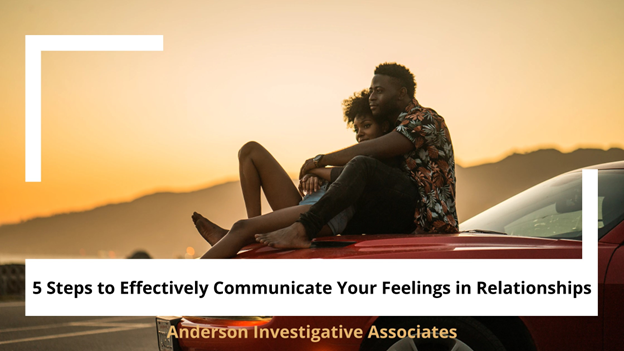
“Trust is the glue of life. It is the most essential ingredient in effective communication. It’s the foundational principle that holds all relationships.”
– Stephen R. Covey –
Welcome to the third in a series of blogs exploring relationships. In the first we looked at building strong and supportive relationships and their importance in the world of interviewing and life, then we examined the importance of an unwavering belief/confidence in yourself. This week we will examine how to effectively communicate your feelings in relationships.
Communication is so important in interviewing, work relationships, and in every aspect of life. The more we can hone these skills, the more effective we will be in every area of our lives. Like the two previous blogs, the more of this you can do in your work world and your greater life arena, the more credible and confident you will be. Consistency builds success.
In all relationships, there’s communication, and then there’s effective communication. Communication is something that takes a lot of work, and once you’ve successfully positioned yourself as a communicator, the next step is to crack the code at being an effective communicator. Analyze where you are in this process and where you have identified personal weaknesses. If you’re at that step, try the following five steps to help you to effectively communicate your feelings.
- Allow Yourself to Feel
Going into a conversation with guilt or apprehension about your feelings? That won’t help you or your communication partner. You’re completely allowed to feel whatever you’re feeling, and you’re also allowed to talk about those feelings, but must do so in an effective manner.
- Label your Feelings
You’re experiencing these feelings, but are you reading more into them? Are you labeling them and trying to put into context the essence of your emotions? It’s not easy to do, but it’s an important exercise for you to do on your own before opening up and sharing with someone else. We must identify the source and basis of those feelings.
- Start with Yourself
If you’re extroverted or you like talking about your feelings a lot, your first inclination may be to talk it out with your communication partner. That’s a great thing to do, but it begins with you. You’ll have a hard time processing everything if you’re influenced by someone else’s insight or advice. Start with yourself, and then work your way up to a discussion with your partner.
- Remember How Much You Matter
You matter to those in your life; your feelings matter to others. Keep this in mind and try to negate the potential fear or hesitation you may be experiencing. Swap those feelings for feelings of confidence and security in the strength of your relationships. Remember the importance of confidence and credibility in the interviewing realm and the communication arena.
- Swap “You” for “I”
Whenever you get close to saying “You made me feel” or “You did this,” swap it for a personal statement. Express your feelings using “I” statements, such as “I feel frustrated when…” or “I am concerned about…” This approach focuses on your emotions and avoids sounding accusatory. A conversation is helpful for you to share your perspective – not for you to point fingers at your loved one. Think about how you feel, why you feel that way, and what has happened to contribute to those feelings. Take responsibility for owning your feelings.
These steps apply in every opportunity for communication, be they personal, work related, or during the interview process.
“The single biggest problem in communication is the illusion it has taken place.” — George Bernard Shaw
Effective communication of feelings in work relationships is crucial for building trust, resolving conflicts, and fostering a positive work environment. Here are some additional suggestions to help you communicate your feelings effectively:
- Choose the Right Time and Place: Find an appropriate time and location for the conversation, ensuring privacy and minimizing distractions.
- Self-Awareness: Before communicating your feelings, take some time to understand and clarify your emotions. Be clear about what you’re feeling and why.
- Be Honest and Authentic: Authenticity is key to building trust. Be honest about your feelings without exaggeration or suppression. Authenticity fosters open and honest communication.
- Active Listening: Encourage the other person to share their perspective and feelings. Listen actively, without interrupting, and show empathy for their point of view.
- Empathetic Communication: Try to understand the other person’s feelings and acknowledge them. Saying something like, “I can see how you might feel that way” demonstrates empathy.
- Maintain a Calm Demeanor: Keep your emotions in check during the conversation. Avoid raising your voice, becoming defensive, or resorting to aggression. Remember this is so important in an interview context.
- Use Nonverbal Cues: Pay attention to your body language, tone of voice, and facial expressions. These nonverbal cues can convey a lot about your feelings.
- Be Solution-Oriented: If there’s an issue or conflict, focus on finding solutions together rather than dwelling on the problem. Offer constructive suggestions and be open to compromise.
- Avoid Blame and Judgment: Instead of blaming or criticizing the other person, share your feelings and experiences in a way that promotes understanding and resolution.
- Seek Feedback: Encourage the other person to share their thoughts and feelings as well. This two-way communication can lead to a better understanding of each other.
- Use Email or Written Communication Sparingly: While written communication can be useful for documenting conversations, it can lack nuance. Especially texting! Reserve sensitive discussions for face-to-face or verbal conversations whenever possible.
- Follow Up: After the initial conversation, follow up to check on progress, see if any further discussions are needed, and ensure that both parties are on the same page.
- Respect Boundaries: Be mindful of the other person’s comfort level with discussing emotions. Respect their boundaries and avoid pressuring them to share more than they’re willing to.
- Seek Mediation: If a situation remains unresolved or escalates, consider involving a neutral third party, such as a manager, HR representative, or a professional mediator, to facilitate communication.
Remember that effective communication of feelings takes practice, and it’s essential for building strong and healthy work relationships. By approaching these conversations with empathy, respect, and a problem-solving mindset, you can navigate workplace challenges and foster better connections with colleagues and superiors.
In interview training we talk frequently about building rapport and establishing commonality as tools to build relationships with those we are interviewing. Much like in that arena, building strong and supportive relationships in interviews and life involves a blend of effective communication, empathy, and understanding.
Conclusion
In this work and world, we should be focused on building and maintaining relationships. We are built for interaction, socialization, and relationship, plus if you are in our shared profession, it is a precursor for continued success. No matter how difficult it is for us, if we recognize it as essential and part of our mission, we will endeavor to succeed at it.
Anderson Investigative Associates is positioned to custom-tailor training to your specific needs. If you have any questions or would like to discuss the above issues of effective communication, or any training need, please reach out. Additional issues pertaining to interviewing, auditing, and investigations can be found in other blogs and videos that I have produced and are contained in most blocks of instruction that our company presents.
If you have additional questions, comments, or have an interviewing topic you would like me to address, give me a shout. In the meantime, be well, stay safe out there, and get busy building your communication skills for relationship building in all aspects of your life.
Mark A. Anderson
Director of Training and Development
Anderson Investigative Associates, llc
114 Loucks Avenue
Scottdale, PA 15683
manderson@andersoninvestigative.com
tel:912-571-6686
